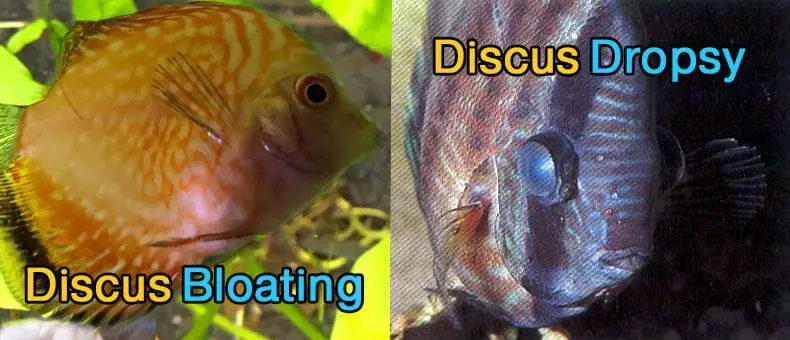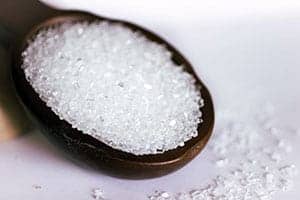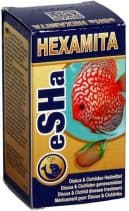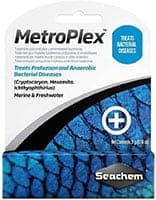
Discus bloat – Is a situation where the intestine of the discus fish is blocked, and food eaten by the discus does not digest and cannot allow the passing out of waste from the anus. This discus fish disease causes bloated belly, i.e., the stomach of the discus begins to swell.
Discus dropsy disease – Is a bacteria infection that causes a condition where the abdominal cavity swells up because of the swelling of the internal organs and tissues of the discus fish.
Table of Contents
To be able to treat discus bloating and Discus dropsy alike, you have to carefully identity them; so many people are confused between discus bloating and Dropsy; the symptoms, causes, and treatments. The two diseases Look the same, but they are completely different. I will show you in detail the difference between both diseases, so you’ll know which one your discus is suffering from and the How to treat Discus bloat.
Symptoms of Discus Bloat
• The discus not eating.
• Spitting back the food that she has eaten.
• Swelling of the belly.
Disease Details and Causes
Discus bloat occurs as a result of overeating, internal parasite, and a defective digestive tract. Bloat in the discus is mostly caused by overeating, which can lead to Bacterial infection, defective digestive tract, Popeye, so you need to keep your discus under proper diet and feeding to reduce cases of overeating. Because the belly of the discus is not designed to hold large meals, overeating can easily result in constipation such that the food stays in the gut until it begins to rot and decay. Bacteria, gas, unhealthy fluids are formed, causing the pressure and the swelling of the swim bladder, which sits on top of the stomach in a discus. The discus loses balance and the discus swimming erratically. As the swelling in the gut increases and the abdomen becomes very distended, the building up of gas and fluid causes the eye to pop out, creating a Popeye effect.
Cloudy eye looks may appear on one or both eyes as bacterial growth increases. The discus fish may become dark, her fins may be clamped, and she will not eat. Early treatment is Paramount as Discus bloat can lead to a more severe disease Like Dropsy, which when in an advanced stage, it is almost impossible for the fish to survive.
Discus Bloat
How to Treat Discus Bloat
Discus Bloat can be treated in a number of ways, such as in relation to the administration through food, as well as administration through fluids.
Treatment Method 1 – In Water Treatment
[STEP 1] – Use Epsom Salt

Add a tablespoon of this Epsom salt for fish to every 40 gallons (150 Litres) of water and reduce the temperature to 86- 88°F; this Increases their metabolic rate and gets the waste out of them. You may check Epsom salt at Amazon from here.
[STEP 2] – Treat with Metronidazole

Because of the Excrete that may have come from the fish poop, there may be traces of Hexamita, add a mild treatment of Metronidazole so that your Discus does not get internal Parasites.
Treatment Method 2 – With Food Treatment
[STEP 1] – Make A Concentrated Solution Of Epsom Salts Or Magnesium Citrate Solution
You can order the below requirements from Amazon:

- SeaChem MetroPlex. (Check its price and Order it from Amazon)
- Thomas Labs Fish Bendazole.
- Maracyn 2. (Check its price and Order it from Amazon)
Mix a very small quantity of Metroplex, Maracyn 2, and Thomas Labs Fish Bendazole, 1/16 teaspoon of each into two tablespoons of the food.
[STEP 2] – Wet The Food With The Epsom Salt Solution
- Mix the food with the Epsom salt solution in order to form a mud-like mass.
- Ensure it is Mashed and mixed thoroughly.
- Then spread it out to dry on a thin sheet.
- Then freeze it.
- Feed it to your fish for one month.
Future Prevention Tips
- Avoid feeding your discus with freeze-dried feeds like frozen worms, even after they have been soaked in liquid, they can still swell up in the belly of the discus and cause bloating.
- Abstain from Feeds with discus meal because discus fish does not easily digest them.
- Avoid using a Plastic worm cone to feed your discus Life or frozen worms because the stronger one can overeat by this means, preferably scatter the worms in the tank to allow the fishes to eat at a reasonably normal amount.
- Feed your discus with Vegetable roughage from green vegetables, algae, or spirulina and grains, such as wheat, rice, potatoes, oats, or corn, because they have little vegetable fiber.
- Feed your discus Roughage in the form of indigestible chitin from unpeeled shrimp, krill, Mysis, and insect larvae.
Discus Dropsy Disease
Symptoms of Discus Dropsy
- Swollen belly.
- Standing Scales that appears like a Pine-Cone.
- Bulgy Eyes.
- Gills that are pale.
- Red and Swollen Anus.
- Pale and stringy poop.
- Ulcers on the body.
- Curved Spines.
- Clamping together of the Fins.
- Redness of the skin or fins.
- Lolling at the bottom of the tank.
- Loss of Appetite.
- Discus Fish swimming erratically.
Disease Details and Causes
What Causes Dropsy In Discus?
Dropsy in the discus is caused by an infection from Aeromonas bacteria commonly present in all aquariums. It is Identified by the swelling of the body cavity, soft tissues, and organs such as the abdomen as a result of the accumulation of water and other fluids in the body of the fish.
Mostly immune deficiency Fishes are affected by these bacteria; healthy fish can be affected but rarely. The immune system of the discus can be compromised by some stress factor Like:
- Bad water quality.
- Nitrite spikes.
- A drastic drop in water temperature.
- Stress from transportation.
- Improper nutrition.
- Aggressive tankmates.
If all the fishes in the tank are under stress, it’s quite likely for the entire tank to become infected, If the infection is not handled immediately, the symptoms may occur progressively from skin lesions, the belly becomes swollen as a result of fluids that should be excreted, internal organs are damaged, and the fish will die eventually. Even with prompt treatment, the rate of mortality is high, except the fish is diagnosed in the early stage of the infection. Early-stage treatment- is very vital because once your fish contracts the disease, it doesn’t take so much time before it dies.
How Long Does Dropsy Take To Kill A Discus Fish?
It takes 15 to 20 days after contraction; the fish can die anytime within this range if proper care is not given early.
Is Dropsy Contagious To Other Fish?
Dropsy is usually not contagious, but it’s far better to isolate fishes that have this condition in a hospital tank to prevent underlying causes affecting the healthy fishes.
How To Treatment Discus Dropsy
[STEP 1] – Quarantine The Sick Fish In A Hospital Tank.
To make water changes easier, except for a filter and heater, this tank should be left bare. The hospital tank temperature should be quite close to that of the original tank as possible.
[STEP 2] – Use Epsom Salt.
For every ten gallons of water in the hospital tank, Far a salt bath. So that the magnesium sulfate in the Epsom salts can help to draw out the excess water from the discus that has caused her to swell.
[STEP 3] – Test Your Water Parameters.
You should test the water in the hospital tank daily to ensure it is healthy for the fish.
[STEP 4] – Feed Your Discus Anti-bacterial Fish Food.
You can either prepare your anti-bacterial fish food at home by adding anti-biotics like chloromycetin or tetracycline to a 1% mixture of Fish food. Or buy already made ones from the market.
[STEP 5] – Feed Your Discus For 7 – 10 Days.
Continue feeding the fishes with those antibiotic fish foods and examine their healing progress for 7-10 days.
[STEP 6] – Treat The Aquarium Water With Maracyn Two.
If you don’t see improvement after seven days of treatment, treat the aquarium water with Maracyn two. This medication is quite effective against bacterial infections and is absorbed through the skin of fish.
After treating your fish for ten days and there are no signs of improvement, or if it becomes worse, it may be that the cause of Dropsy is not bacterial. If the antibiotics do not work, and the salt bath is ineffective, there may be nothing else you can do for your fish.
Future Prevention Tips
- Maintain good water quality in your tank; this is one of the best ways to prevent Dropsy.
- Be consistent in changing the water in your fish tank by about 25%-30% of the water weekly and a larger water change of about 50% Of the aquarium water monthly.
- Avoid overcrowding in your aquarium, it can result in stress which can lead to Dropsy
- Avoid feeding your discus so much; they eat mildly, and uneaten food can decompose at the bottom of the tank and can contaminate the water with bacteria.
- The tank should always be clean.
- Regularly clean the Filter.
- Always remove waste from the bottom of the tank with a gravel vacuum.
- Use flake foods within one month of opening.
- Keep your discus away from any form of stress, as listed above. stress is key to the development of Dropsy.
Conclusion
Dropsy is a condition that is usually very severe in fish. The key to preventing Dropsy is to keep your aquarium clean and as stress-free as possible for the health of your fish. Bloating is mostly caused by overeating of the discus. Although the symptoms of bloating and Dropsy are alike, they are not the same as Dropsy can kill the discus fish faster, it takes time to completely heal, and the mortality rate is high.
If you notice any symptoms of Dropsy in your fish, take action as fast as possible to treat the disease. The best thing you could do is to ensure your tank is kept clean that way, you are less at risk of your fish getting sick. Some Internal discus fish diseases like Dropsy and bloating need intensive care and medications which can be given via water or food, whichever one works for your \Discus fish is totally acceptable.


How much epsom salts to treat a discus with bloat in litres? I dont understand gallons. Thanks.
40 gallons = 150 Litres
Thank you kindly for the treatment advice! Prosperous New Years! Happy Discus keeping.
Happy new year .. thanks